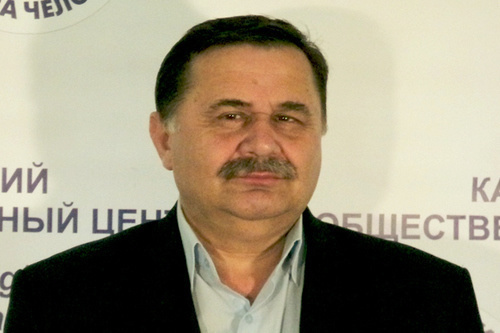
Circassian Activist Accuses Moscow of Treating Kabardino-Balkaria Like a Colony
Publication: Eurasia Daily Monitor Volume: 11 Issue: 168
By:

In an interview with the Kavkazskaya Politika website, Valery Khatazhukov, a well-known civil rights activist based in Kabardino-Balkaria, detailed his disappointment with the way the Russian government treats the North Caucasus. “Moscow constructs its governance system in the ethnic republics of the North Caucasus on the basis of relations between the metropolis and its colonies,” he said, adding that locals tapped by Moscow to rule there “are given carte blanche in the subordination of their fellow citizens.” As a result, Khatazhukov said, in a republic like Kabardino-Balkaria, which is a pro-Russian entity, people become resentful. “The attitude toward the North Caucasus as a colonial periphery contributes not to preserving the unity of Russia, but to […] its disintegration,” he said (kavpolit.com, September 15).
The difference in the treatment of ethnic-Circassian refugees from Syria and ethnic-Russian refugees from Ukraine is the most recent cause of friction between Circassians and Russians. A group of Circassians sent an open letter to the acting governor of Kabardino-Balkaria, Yuri Kokov, asking that the government treat Circassian refugees from Syria the same as Russian refugees from Ukraine (zapravakbr.ru, August 7). Kabardino-Balkaria has promised to take up to 500 ethnic-Russian refugees from eastern Ukraine and provided full board and lodging for them at the expense of the republican budget (kavkaz-uzel.ru, June 25). Circassian refugees from Syria, on the other hand, received no government-funded benefits and many were even refused Russian visas.
As a civil rights activist, Khatazhukov is mostly concerned with the security situation in the republic and the related abuses of power committed by the law enforcement agencies. Extra-legal reprisals, kidnappings and other human rights violations have become endemic in the republic, according to the activist. He said that to improve the situation in Kabardino-Balkaria, society must exercise control over the government. However, Moscow took away the right of the people of Kabardino-Balkaria to elect their own governor. “The [current] leader of the republic must receive the real support of his people through elections,” Khatazhukov said. “This support will, in turn, become a weighty argument to [make to] the federal leadership and for the governor himself in defending the interests of the population [of Kabardino-Balkaria]” (kavpolit.com, September 15).
For now, however, acting Governor Kokov, using his administrative powers, quietly unseated a majority of the republican parliament’s deputies in recent elections, replacing them with his own supporters. On October 9, the regional parliament is expected to confirm Kokov as Kabardino-Balkaria’s governor, and no surprises are expected there (kavpolit.com, September 15).
Khatazhukov may be quite right to propose having free and direct elections of governors in the region, but the question is whether Moscow really wants strong governors in the North Caucasus, who would enjoy the support of their constituents and potentially challenge the so-called “power vertical.” In particular, given that Russian President Vladimir Putin hardly recognizes the leaders of neighboring countries as his legitimate counterparts, he almost certainly would not like to have regional governors be elected officials and, therefore, more independent. Putin would then have to treat them not as his voiceless subordinates, but colleagues. The true federalization of the Russian Federation can happen only after Putin leaves his office, although there is no guarantee the country will automatically turn into a real federation after he leaves power.
Since the Russian strongman appears intent on remaining in office for a long time, there is little hope for imminent positive changes in the North Caucasus. It is no surprise, therefore, that many Circassians look to their neighbors to find some support for their claims and interests. After years of animosity, Georgia has unexpectedly turned into an ally of the Circassians. Whereas, Moscow has rejected Circassian demands that it recognize the Circassian genocide of the 19th century. The Russian government also made no effort to show appreciation for Circassian culture during the 2014 Sochi Winter Olympics, which was held on their ancestral lands. And Russia has made almost no moves to accept Circassian refugees from Syria. Consequently, the attitude of Circassians toward Georgia incrementally improved.
The visit to Tbilisi, several years ago, of Ibragim Yaganov, the Circassian activist and the veteran of the Georgian-Abkhaz war in the 1990s, was considered at the time to be sensational. Today, when a team of state archivists from Kabardino-Balkaria travel to Tbilisi to photocopy archival materials pertaining to the Russo-Circassian war of the 19th century, it is considered practically routine. The archivists from Kabardino-Balkaria have identified over 200 volumes of interest stored in Tbilisi state archives (kbrria.ru, September 18). Some Circassians are even calling for a union between the Georgians and the Circassians (forumkavkaz.com, September 16).
As Moscow continues to insist on micro-managing politics in the North Caucasus, tensions on the ground rise because people are demanding a greater say in their affairs. Local elites are signaling that Russia’s strategy in the region may backfire since people have become frustrated over their inability to influence policies through electoral mechanisms. The central government’s unwillingness to deal with the problem of representation thus creates a breeding ground for political discontent and the basis for growing unrest in the region.




